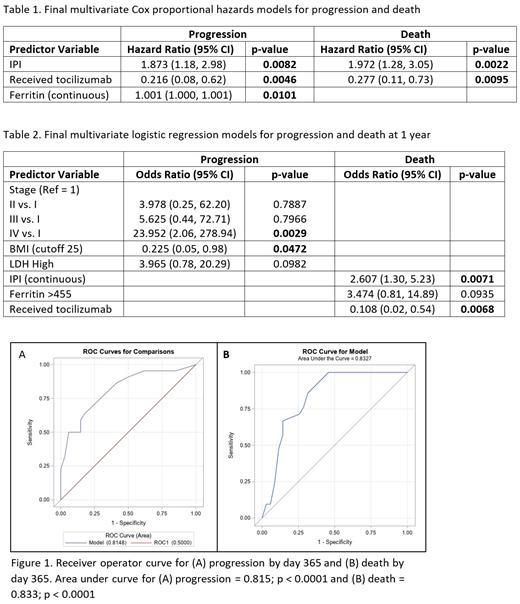Abstract
Introduction: Chimeric antigen receptor (CAR) T-cell therapy has revolutionized treatment of relapsed/refractory (R/R) B-cell lymphomas. Despite this improvement, a subset of patients do not respond to treatment or relapses afterwards. The purpose of this study is to determine patient clinical and radiographic variables that may be predictive of response to CAR-T therapy in order to improve patient selection for CAR-T therapy.
Methods: We conducted a single-center retrospective review of all R/R B-cell non-Hodgkin lymphoma patients who received infusion of CAR T-cells from 2017-2020 and had one PET scan post-treatment for response evaluation. Clinicopathological and radiographic parameters were identified a-priori and collected through chart review. PET parameters included standardized uptake value (SUV), total metabolic tumor volume (TMTV), and total lesion glycolysis (TLG). For continuous parameters without established cutoffs, variables were dichotomized separately for time to progression and time to death using the Contal and O'Quigley method. Risk factors for progression free survival (PFS) and overall survival (OS) were identified by constructing a univariate Cox proportional hazards regression model. Variables meeting a p-value threshold of 0.10 for PFS or OS were included in stepwise selection to create a final multivariate model for PFS and OS at one year. Variables were retained with a p-value ≤0.05. The same process was also completed to create multivariate logistic regression models for progressive disease and death at one year. The final multivariate logistic regression models were used to estimate the area under the receiver operating curve (AUROC).
Results: 64 patients with R/R lymphoma (87% DLBCL) were included in the study. At a median follow up of 23.7 months (95% CI: 16.8 months, 28.8 months), 37 patients (57.8%) progressed and 33 patients (51.6%) remain alive. Median progression free survival (PFS) at 1 year was 9.0 months (95% CI: 3.1 months, not reached) and median overall survival (OS) at 1 year was not reached, though the lower bound of its 95% CI is 11.4 months. Investigating progression at 1 year, the following variables met a p-value threshold of 0.10 in univariate Cox regression models and were therefore included in stepwise selection of the multivariate model for progression: stage (III/IV vs I/II) (odds ratio (OR) 3.132, p=0.0824), extranodal involvement (OR 2.117, p=0.0314), IPI score (OR 1.467, p=0.0125) and tocilizumab administration (OR 0.555, p=0.0932). The final multivariate model identified IPI (OR 1.972, p=0.0022) and tocilizumab administration (OR 0.277, p=0.0095) as predictive variables for PFS at 1 year. Investigating OS at 1 year, the following variables met a p-value threshold of 0.10 in univariate Cox regression models and were therefore included in stepwise selection of the multivariate model for survival: ECOG 2 (OR 4.677, p=0.0757), LDH high (OR 2.401, p=0.0453), CNS involvement (OR 5.030, p=0.0105), IPI (OR 1.720, p=0.0075), Ferritin pre CAR T (continuous) (OR 1.001, p=0.0041), CRS (OR 0.437, p=0.0658), tocilizumab administration (OR 0.363, p=0.0363), TMTV >89 (OR 2.479, p=0.0442), TLG >229 (OR 2.188, p=0.0918), and SUV >18 (OR 2.116, p=0.0906). The final multivariate model identified IPI (OR 1.973, p=0.0082), ferritin (OR 1.001, p=0.0101), and tocilizumab administration (OR 0.216, p=0.0046) as predictive variables for OS at 1 year. The multivariate logistic regression model identified stage IV disease (OR 23.952, p=0.0029) and BMI >24 (OR 0.225, p=0.0472) as predictors for progression at 1 year and IPI (OR 2.607, p=0.0071) and tocilizumab administration (OR 0.108, p=0.0068) as predictors for survival at 1 year. The AUROC for progression and death were 0.815 (p<0.0001) and 0.833 (p<0.0001), respectively.
Conclusions: Both clinical and radiographic variables identify R/R lymphoma patients who are at low or high risk for progression and/or poor overall survival after CAR T-cell therapy. IPI, ferritin, BMI, advanced stage, and tocilizumab administration may be predictors of response. These results need validation in larger prospective trials.
Kamdar: Celgene (BMS): Consultancy; Adaptive Biotechnologies: Consultancy; ADC Therapeutics: Consultancy; AstraZeneca: Consultancy; Genetech: Other; Kite: Consultancy; KaryoPharm: Consultancy; AbbVie: Consultancy; Genentech: Research Funding; TG Therapeutics: Research Funding; SeaGen: Speakers Bureau; Celgene: Other.


This feature is available to Subscribers Only
Sign In or Create an Account Close Modal